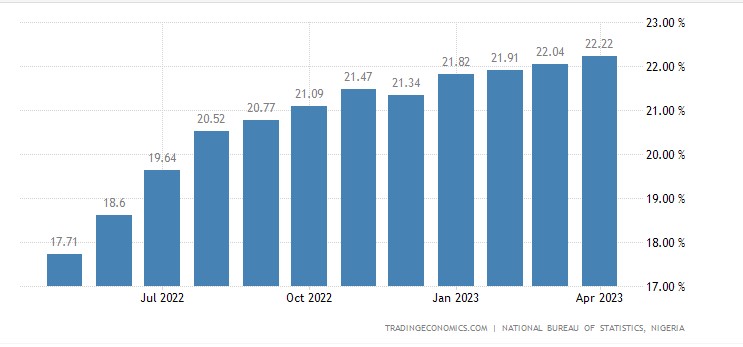The National Bureau of Statistics (NBS) has said Nigeria’s headline inflation rose to 22.22 per cent in April from 22.04 per cent in March.
The statistics office disclosed this in its Consumer Price Index (CPI) for April 2023, released on Monday, May 15.
NBS uses CPI to measure the overall change in consumer prices based on a representative basket of goods and services over time.
According to the report, the April inflation rate showed an increase of 0.18 per cent points compared to the previous month’s headline inflation rate.
It showed that on a year-on-year (YoY) basis, the headline inflation rate was 5.40 per cent points higher than the 16.82 per cent rate recorded in the corresponding month of April 2022, while on a month-on-month (MoM) basis, it was 0.05 per cent points higher than the 1.86 per cent rate recorded in March 2023.
The items that contributed to the increase in the headline index on a YoY basis were food and non-alcoholic beverages, which contributed 11.51 per cent; housing, water, electricity, gas and other fuel, 3.72 per cent; clothing and footwear, 1.70 per cent; transport 1.45 per cent; and furnishings and household equipment and maintenance, 1.12 per cent.

Others were education, 0.88 per cent; health, 0.67 per cent; miscellaneous goods and services, 0.37 per cent; restaurant and hotels, 0.27 per cent; alcoholic beverages, tobacco and kola, 0.24 per cent; recreation and culture, 0.15 per cent; and communication, 0.15 per cent.
In the review month, the food inflation rate rose to 24.61 per cent on a YoY basis, which was 6.24 per cent points higher than the 18.37 per cent rate recorded in April 2022.
“The rise in food inflation on a year-on-year basis was caused by increases in prices of oil and fat, bread and cereals, fish, potatoes, yam and other tubers, fruits, meat, vegetable, and spirits,” NBS stated.
On a month-on-month (MoM) basis, the food inflation rate in April stood at 2.13 per cent, representing 0.06 per cent points higher than the 2.07 per cent rate recorded in March 2023.
The surge in inflation has been attributed to persistent food shortages.
Food prices in Nigeria have been rising due to the naira’s depreciation against the dollar and the continued ripple effects of the Russia-Ukraine war.
Core inflation, which excludes the prices of unstable agricultural produce, stood at 20.14 per cent in April, up by 5.96 per cent compared to the 14.18 per cent recorded in April 2022.
The highest increases were recorded in gas prices, passenger transport by air, liquid fuel, vehicle spare parts, powers, lubricants for personal transport equipment, medical services, and passenger transport by road, among other items of the basket.
Inflation has been on the up in Africa’s biggest economy for 10 straight months before an exception in December’s figure of 21.34 per cent, and the monetary policy committee of the Central Bank of Nigeria (CBN) has increasingly raised its monetary policy rate (MPR) tool to rein in inflation.
From April 2022, the committee has raised MPR from 11.50 per cent to 18 per cent in its last meeting in March.
The executive vice chairman of Highcap Securities Limited, David Adonri, told The ICIR that “monetary policy tools are failing, and the CBN has been hiking interest rates to battle inflation, which keeps rising. Meaning that the monetary policy tool has failed.”
The managing director of Cowry Asset Management, Johnson Chukwu, said, “The effects of foreign exchange depreciation are hard felt too, as an import-dependent country. So, whenever the domestic currency falls relative to the dollar, this inevitably raises the prices of imported things, which does not help the food inflation situation.
“In our northern region, where most of the country’s farmlands are located, terrorism and insurgency have largely restricted farming, deepening the food shortage.”
Chukwu stressed at an event held on April 5 that households in a low-income country such as Nigeria were particularly exposed to changes in the price of staple cereals, with diets concentrated on just one type of grain.
Source: The International Centre for Investigative Reporting

